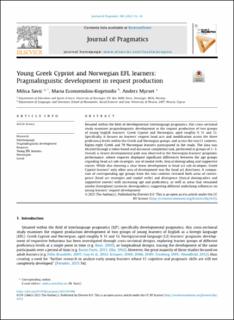Young Greek Cypriot and Norwegian EFL learners: Pragmalinguistic development in request production
Peer reviewed, Journal article
Published version

View/
Date
2021Metadata
Show full item recordCollections
Original version
Savić, M., Economidou-Kogetsidis, M., & Myrset, A. (2021). Young Greek Cypriot and Norwegian EFL learners: Pragmalinguistic development in request production. Journal of Pragmatics, 180, 15-34. 10.1016/j.pragma.2021.04.006Abstract
Situated within the field of developmental interlanguage pragmatics, this cross-sectional study examines pragmalinguistic development in the request production of two groups of young English learners: Greek Cypriot and Norwegian, aged roughly 9, 11 and 13. Specifically, it focuses on learners' request head acts and modification across the three proficiency levels within the Greek and Norwegian groups, and across the two L1 contexts. Eighty-eight Greek and 79 Norwegian learners participated in the study. The data was elicited through a video-based oral discourse completion task, performed in groups of 3–5. Overall, a clearer developmental path was observed in the Norwegian learners' pragmatic performance, whose requests displayed significant differences between the age groups regarding head act sub-strategies, use of modal verbs, lexical downgrading and supportive moves. While also showing a clear linear development in head act sub-strategies, Greek Cypriot learners' only other area of development was the head act directness. A comparison of corresponding age groups from the two contexts revealed both areas of convergence (head act strategies and modal verbs) and divergence (lexical downgraders and supportive moves) with increasing age and proficiency, as well as areas that remained similar throughout (syntactic downgraders), suggesting different underlying influences on young learners’ request development.
